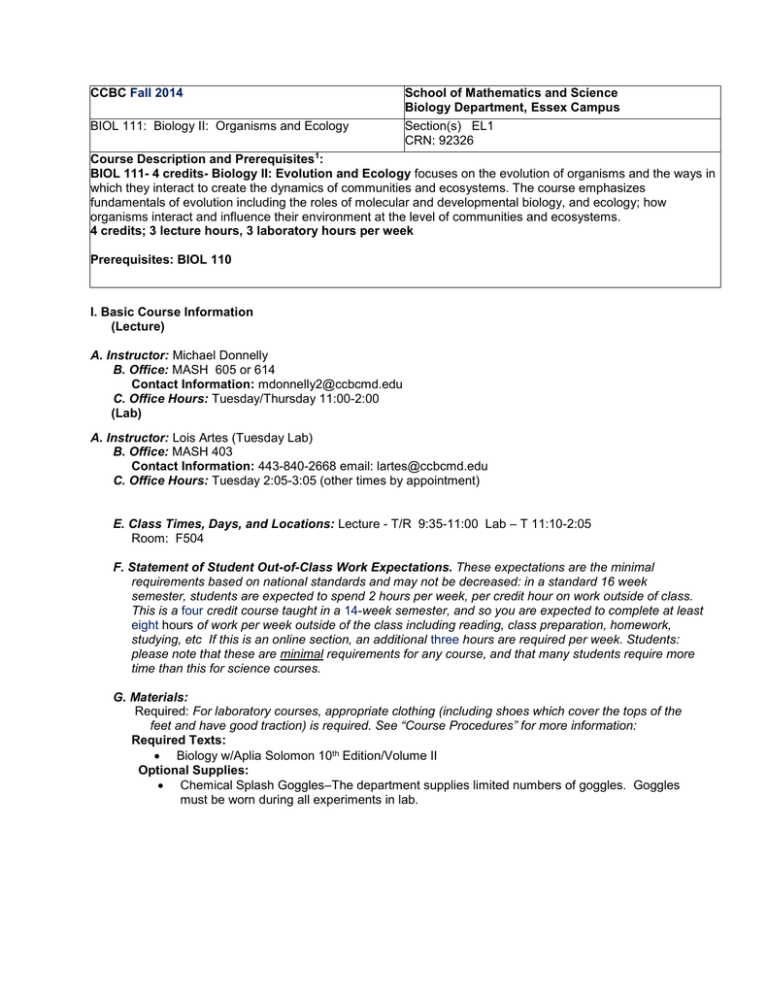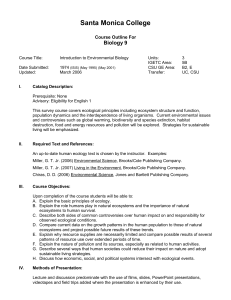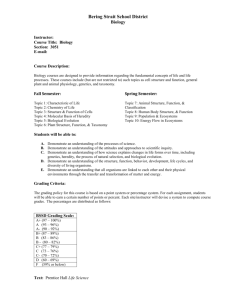File - Sneha Shrestha's e
advertisement

CCBC Fall 2014 School of Mathematics and Science Biology Department, Essex Campus BIOL 111: Biology II: Organisms and Ecology Section(s) EL1 CRN: 92326 Course Description and Prerequisites1: BIOL 111- 4 credits- Biology II: Evolution and Ecology focuses on the evolution of organisms and the ways in which they interact to create the dynamics of communities and ecosystems. The course emphasizes fundamentals of evolution including the roles of molecular and developmental biology, and ecology; how organisms interact and influence their environment at the level of communities and ecosystems. 4 credits; 3 lecture hours, 3 laboratory hours per week Prerequisites: BIOL 110 I. Basic Course Information (Lecture) A. Instructor: Michael Donnelly B. Office: MASH 605 or 614 Contact Information: mdonnelly2@ccbcmd.edu C. Office Hours: Tuesday/Thursday 11:00-2:00 (Lab) A. Instructor: Lois Artes (Tuesday Lab) B. Office: MASH 403 Contact Information: 443-840-2668 email: lartes@ccbcmd.edu C. Office Hours: Tuesday 2:05-3:05 (other times by appointment) E. Class Times, Days, and Locations: Lecture - T/R 9:35-11:00 Lab – T 11:10-2:05 Room: F504 F. Statement of Student Out-of-Class Work Expectations. These expectations are the minimal requirements based on national standards and may not be decreased: in a standard 16 week semester, students are expected to spend 2 hours per week, per credit hour on work outside of class. This is a four credit course taught in a 14-week semester, and so you are expected to complete at least eight hours of work per week outside of the class including reading, class preparation, homework, studying, etc If this is an online section, an additional three hours are required per week. Students: please note that these are minimal requirements for any course, and that many students require more time than this for science courses. G. Materials: Required: For laboratory courses, appropriate clothing (including shoes which cover the tops of the feet and have good traction) is required. See “Course Procedures” for more information: Required Texts: Biology w/Aplia Solomon 10th Edition/Volume II Optional Supplies: Chemical Splash Goggles–The department supplies limited numbers of goggles. Goggles must be worn during all experiments in lab. II. Course Goals Overall A. Course Objectives1: Upon completion of this course the student will be able to: 1. apply scientific methodology in the laboratory by using controls, metric system measuring, and scientifically acceptable data recording with tables and graphs where appropriate; 2. explain the evidence for evolution by natural selection, Charles Darwin’s contribution to the theory of evolution, and the Modern Synthesis; 3. summarize the interactions that control genetic variation at the population level; 4. determine if a species is evolving or is in genetic equilibrium using the Hardy-Weinberg equation; 5. explain and predict how isolating mechanisms can give rise to new species; 6. know the developmental stages and structures of an embryo and relate it to the organism’s evolutionary history; 7. identify the genetic component in evolutionary patterns of development and how current biotechnology is helping to redefine this area; 8. describe the energy flow through an ecosystem and how the major biochemical cycles in the ecosystems can be impacted when humans disturb the equilibrium of these cycles; 9. explain the interactions of abiotic and biotic factors that control populations; 10. describe the relationship between disturbance and succession; 11. explain the biome as an extension of an ecosystem; 12. compare and contrast several major aquatic and terrestrial biomes; and 13. evaluate scientific literature and present credible information in an organized manner. B. Major Topics1: I. Darwinian Evolution and the Modern Synthesis II. Microevolution: the genetics of populations III. Macroevolution: the evolution of species IV. Developmental Biology: the development of organisms at the cellular level V. Evolutionary Developmental Biology: the role of molecular and developmental biology to evolutionary theory. VI. Community Ecology: intraspecific and interspecific relationships VII. Ecosystems: productivity and biogeochemical cycling in ecosystems and the interactions between biotic and abiotic components C. Rationale: To give students an understanding of the mechanisms that operate to perpetuate life at all levels of the biosphere and to appreciate that delicate interdependence of organisms with each other and the physical environment. Critical thinking and reasoning skills will be encouraged in both the lecture and the laboratory. III. Evaluation A. Requirements1: Lecture Portion of Course: See breakdown below under B. Instructors grading policy Lab Portion of Course: See breakdown below under B. Instructors grading policy B. Instructor's grading policy: The student’s final grade for BIO 111 will be based on a total accumulation of points with a maximum score of 840 points. Late assignments will drop one letter grade per class. 20 points 100 points 120 points 375 points 175 points Attendance Term Paper Lecture Quizzes (10 points each) 3 Exams – 125 points each Exam 4 - (cumulative final) 110 points 50 points _50 points 1000 points Lab Quizzes (Top 11 labs) Labs (Top 10 – 5 pts each) 1 individual formal lab report Total A = 900-1000 B = 800-899 C = 700-799 D = 600-699 F = 0-599 Grades will be posted in Blackboard as soon as I have them graded. This will allow you to keep track of grades. C. Instructor's attendance policy: Attendance at each class and lab is essential. Please be on time. Students with a legitimate problem about attendance should discuss the situation with their instructor. It is expected that each student will be present at the specified starting time and prepared with any assignment(s) given. Likewise, it is expected that each student will arrange his/her schedule to permit remaining in class the full allotted time. In the case of an absence, it will be YOUR responsibility to get the missed information. I will not supply students with handouts missed they will be available on blackboard! Simply leaving a message, asking the instructor to reach you will not be acceptable. It is your responsibility to reach the instructor, not the instructor’s responsibility to reach you. Attendance will be taken at the beginning of the class period, students who arrive after the class start period begins are considered late. If a student does not check in with the instructor at the end of class they will be considered absent (it is the student’s responsibility to sign in!!) Every 3 times you are late will count as one absence. Lecture: Students are expected to be present for exams. Makeup lecture exams will be given only to students who have a valid excuse, as determined by the instructor. Make up exams will not be the same format i.e. essay or fill in the blank. Lab: There are no makeup’s for missed quizzes. Makeup lab exams will be given only to students who have a valid excuse, as determined by the instructor. Labs are an integral part of the course, and if a student misses a lab it is impossible to be make up. If a student misses more than 2 labs they will automatically fail the course. If a student misses a lab, points will be deducted from that lab when graded. Labs are to be completed during the lab class period. Lab will be collected weekly during the semester and should be ready to be turned in weekly. D. Instructor’s audit policy: Important notes: (1) you can no longer wait until mid-semester to decide that auditing a course is appropriate: the final date to change to an audit now coincides with the final date for withdrawing with a 50% refund, and (2) failure to participate in the class as follows will result in a grade of “W” instead of “AU.” Students who audit are required to attend both the lecture and lab portion of the class but are not required to complete homework assignments nor take exams. IV. Course Procedures A. Course-related policies and procedures No food or drink is allowed in any Science lab at any time. Feet should be covered with closedtoed shoes to provide protection from broken glass and other laboratory hazards. Eye, hand, skin and clothing protection may be required when chemical or biological hazards are present. Failure to abide by this policy will result in removal of students from the class. B. College wide syllabus policies: For college wide syllabus policies such as the Code of Conduct related to Academic Integrity and Classroom Behavior or the Audit/ Withdrawal policy, please go to the ‘MySyllabiPolicies’ Tab on the MyCCBC page. Please pay particular attention to the following sections of MySyllabiPolicies: Attendance Policy Code of Conduct for Academic Integrity Grades – AU The last day to switch to audit for Fall, 2014 is September 16, 2014 Grades -W The last day to withdraw for Fall, 2014 is November 5, 2014 C. Contact information for course-related concerns: See endnote for contact information2. D. Additional Procedures: No food or drink is allowed in any science lab at any time. Feet should be covered with closed-toed shoes to provide protection from broken glass, spilled chemicals, and other laboratory hazards. Eye, hand, skin and clothing protection may be required when chemical or biological hazards are present. Failure to abide by laboratory safety policies will result in removal of students from the class. E. Course calendar/schedule: CCBC Closed: November 26-28 Final Exam: 12/11 See the printed schedule appended to this document. This syllabus may be changed with notification to the class. Note that the content in these sections is dictated by the Common Course Outline for this course, as approved at the college-wide level: [http://www.ccbcmd.edu/cco/home.html] 2 Students should first attempt to take concerns to the faculty member. If students are unable to resolve course-related concerns with the instructor, they should contact Ms. Christine DeStefano, Essex Department Chair at cdestefano@ccbcmd.edu or 443-840-2673. Lecture Schedule Week 8/27 9/2 9/9 9/16 9/23 Day/ date Chapter 18 18 19 19 20 20 21 21 22 23 9/30 10/7 10/14 10/21 10/28 11/4 11/11 11/18 11/25 12/2 12/9 12/11- 23 24-26 24-26 27-29 27-29 30-32 30-32 33 33 50-51 50-51 52 52 53 54 55-56 57 Topic Lect 0 Intro/Review/Lect 1 Darwinian Evolution Lecture 1 Darwinian Evolution Lecture 2 Evolutionary Change in Populations Lecture 2 Evolutionary Change in Populations Lecture 3 Speciation and Macroevolution Lecture 3 Speciation and Macroevolution Lecture 4 The Origin and Evolutionary History of Life Lecture 4 The Origin and Evolutionary History of Life Lecture 5 The Evolution of Primates Lecture 6 Understanding Diversity: Systematics Test 1: Lectures 1-5 Lecture 6 Understanding Diversity: Systematics Lecture 7 Viruses, Bacteria, and Protists Lecture 7 Viruses, Bacteria, and Protists Lecture 8 Plants and Fungi Lecture 8 Plants and Fungi Lecture 9 Animals Lecture 9 Animals Lecture 10 Plant Development Test 2 Lectures 6-9 Lecture 10 Plant Development Lecture 11 Reproduction and Animal Development Lecture 11 Reproduction and Animal Development Lecture 12 Animal Behavior Lecture 12 Animal Behavior Lecture 13 Intro to Ecology: Population Ecology Lecture 14 Community Ecology Test 2 Lecture 10-14 Lecture 15 Ecosystems and the Geography of Life Lecture 16 Biological Diversity and Conservation Biology Cumulative Final Exam/ quizzes Q Q Q Q E Q Q Q E Q Q Q Q E Q Date Lab # Tues 9/2 1 Tues 9/9 2 Tues 9/16 3 Tues 9/23 4 Tues 9/30 5 Tues 10/7 6 Tues 10/14 7 Tues 10/21 8 Hominids (Lab report drafts accepted) Tues 10/28 9 Classification Tues 11/4 10 Diversity of Life & Plant radish seedlings/Hypothesize/Predict results *Lab Report Due Tues 11/11 11 Embryology & treat radish seedlings 12 Animal Behavior & treat radish seedlings 13 Pollution-Rapid Radish (Share Data) Tues 11/18 Tues 11/25 Wed 11/26Sun 11/30 Tues12/2 Tues12/9 Title Lab Safety/Measurements/Lab Equipment View Safety Presentation, Take Quiz & Sign Acknowledgement/Agreement Sheet Sampling Duckweed Ecology (Note: Lab Report due 11/4 on this lab) Succession & Observe/Count Duckweed Field Study Investigation/Oak Tree Sampling & Observe/Count Duckweed Scientific Method - Owl Ecosystem Investigation Hypothesis vs. Prediction/Count Duckweed/Share Data (Reminder: Duckweed Lab Report due 11/4) Hardy Weinberg - Population Genetics (Lab report drafts accepted) No Labs Scheduled; No classes scheduled 11/26 -11/30 (closed 11/27 & 11/28) 14 Case Study





